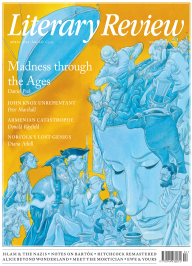Michael Eaude
Chaotic City
The Seven Madmen
By Roberto Arlt (Translated by Nick Caistor)
Serpent’s Tail 323pp £8.99
The greatness of Roberto Arlt lies in his energy, his nightmarish descriptions of the modern city that crushes the poor’s dreams and his portrayal of madness – or divided souls. The Seven Madmen, published in 1929 and the best known of his four novels, is also a prescient parable of the rise of fascism. Its first impression is of sprawl and repetition – written, as critics joked, by an eighth madman. The impression is enhanced by the disordered lives and ideas of the book’s characters.
Born in 1900, son of immigrants from eastern Europe to Argentina, Arlt was a contemporary of Borges. The latter’s vast erudition, polished gems and longevity have given him a reputation that has outshone most other Argentine writers. Arlt was self-educated and colloquial in his style, something of a rough diamond, an anti-Borges. In his day a renowned journalist and short-story writer, he died suddenly in 1942. This edition contains critical afterwords by Roberto Bolaño and Nick Caistor, who has done a fine job translating Arlt’s unorthodox syntax and colloquialisms.
Argentina, after removing its indigenous peoples, invited immigration from Europe. By the 1920s, cattle and wheat had placed it among the top ten wealthiest nations in the world. Buenos Aires was a huge city of boulevards, elegant blocks of flats and an impoverished working class – all the virtues and

Sign Up to our newsletter
Receive free articles, highlights from the archive, news, details of prizes, and much more.@Lit_Review
Follow Literary Review on Twitter
Twitter Feed
Under its longest-serving editor, Graydon Carter, Vanity Fair was that rare thing – a New York society magazine that published serious journalism.
@PeterPeteryork looks at what Carter got right.
Peter York - Deluxe Editions
Peter York: Deluxe Editions - When the Going Was Good: An Editor’s Adventures During the Last Golden Age of Magazines by Graydon Carter
literaryreview.co.uk
Henry James returned to America in 1904 with three objectives: to see his brother William, to deliver a series of lectures on Balzac, and to gather material for a pair of books about modern America.
Peter Rose follows James out west.
Peter Rose - The Restless Analyst
Peter Rose: The Restless Analyst - Henry James Comes Home: Rediscovering America in the Gilded Age by Peter Brooks...
literaryreview.co.uk
Vladimir Putin served his apprenticeship in the KGB toward the end of the Cold War, a period during which Western societies were infiltrated by so-called 'illegals'.
Piers Brendon examines how the culture of Soviet spycraft shaped his thinking.
Piers Brendon - Tinker, Tailor, Sleeper, Troll
Piers Brendon: Tinker, Tailor, Sleeper, Troll - The Illegals: Russia’s Most Audacious Spies and the Plot to Infiltrate the West by Shaun Walker
literaryreview.co.uk